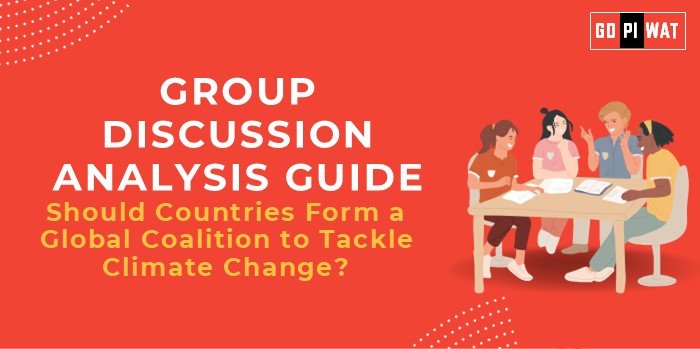📋 Group Discussion Analysis Guide: Should Countries Form a Global Coalition to Tackle Climate Change?
🌐 Introduction to the Topic
- Opening Context: Climate change represents one of the most pressing global challenges, impacting ecosystems, economies, and human societies. A global coalition could centralize efforts, unify goals, and amplify outcomes.
- Topic Background: Global frameworks like the Paris Agreement (2015) aim to mitigate climate impacts through collective action. However, uneven contributions, varied priorities, and insufficient progress highlight the need for a stronger coalition.
📊 Quick Facts and Key Statistics
🌍 Global Carbon Emissions (2023): 36.8 billion metric tons – underscores the urgent need for reduction strategies.
🌪️ Economic Loss from Climate Disasters (2023): $280 billion globally – exemplifies financial consequences of inaction.
💰 Renewable Energy Investment (2023): $500 billion worldwide – shows commitment, but unequal global contributions.
🌐 Paris Agreement Signatories: 195 countries – an example of a partial coalition approach.
🌪️ Economic Loss from Climate Disasters (2023): $280 billion globally – exemplifies financial consequences of inaction.
💰 Renewable Energy Investment (2023): $500 billion worldwide – shows commitment, but unequal global contributions.
🌐 Paris Agreement Signatories: 195 countries – an example of a partial coalition approach.
👥 Stakeholders and Their Roles
- 🏛️ National Governments: Policy formulation, funding, and implementation.
- 🌐 International Organizations (e.g., UNFCCC): Coordination, monitoring, and advocacy.
- 🏢 Private Sector: Investment in renewable energy, innovation, and corporate sustainability.
- 🌱 Civil Society: Awareness campaigns and grassroots mobilization.
- 🌍 Vulnerable Nations: Advocates for immediate action due to disproportionate impacts.
🏆 Achievements and Challenges
✨ Achievements
- 🌍 Paris Agreement: A milestone in global climate diplomacy.
- ☀️ Renewable Energy Growth: Solar and wind capacity doubled in the past decade.
- 📉 Carbon Pricing: 70+ jurisdictions implementing mechanisms.
⚠️ Challenges
- ⚖️ Unequal Commitments: Developed vs. developing nations’ disparities.
- 💰 Financing: $100 billion annual pledge unmet.
- 🔍 Compliance Issues: Lack of enforcement mechanisms.
🌍 Global Comparisons:
- ✅ Success: EU’s Green Deal shows a unified regional approach.
- ❌ Struggles: Brazil’s deforestation policies contradict global goals.
📚 Case Studies:
- ☀️ India’s Solar Mission: Rapid capacity expansion under International Solar Alliance.
- 💡 USA’s Inflation Reduction Act (2022): Boosts clean energy investment.
📢 Structured Arguments for Discussion
- ✅ Supporting Stance: “A global coalition would streamline funding, accountability, and innovation, as seen in the Paris Agreement’s framework.”
- ❌ Opposing Stance: “National priorities and sovereignty conflicts may hinder a coalition’s efficiency.”
- ⚖️ Balanced Perspective: “While collective action amplifies impact, localized solutions are equally essential.”
🧠 Effective Discussion Approaches
- 🎯 Opening Techniques:
- “According to the IPCC, limiting warming to 1.5°C requires global emissions to halve by 2030—an impossible feat without unified action.”
- “China and the USA, the top two emitters, contribute 40% of global emissions—making coalition leadership imperative.”
- 🤝 Counter-Argument Handling:
- Address sovereignty concerns with examples of flexible agreements like the Kyoto Protocol.
- Highlight co-benefits, e.g., economic opportunities from green tech.
📊 Strategic Analysis (SWOT)
- Strengths: Collaborative innovation, unified goals.
- Weaknesses: Funding gaps, enforcement challenges.
- Opportunities: Green economy growth, global partnerships.
- Threats: Political disagreements, inequitable resource distribution.
🎓 Connecting with B-School Applications
- 💼 Real-World Applications: Environmental finance, corporate sustainability strategies, cross-border collaboration.
- 📚 Sample Interview Questions:
- “How would you address the equity issue in a global climate coalition?”
- “What lessons can we learn from the Paris Agreement’s shortcomings?”
- 💡 Insights for Students: Research on carbon markets, circular economy, and ESG compliance.


